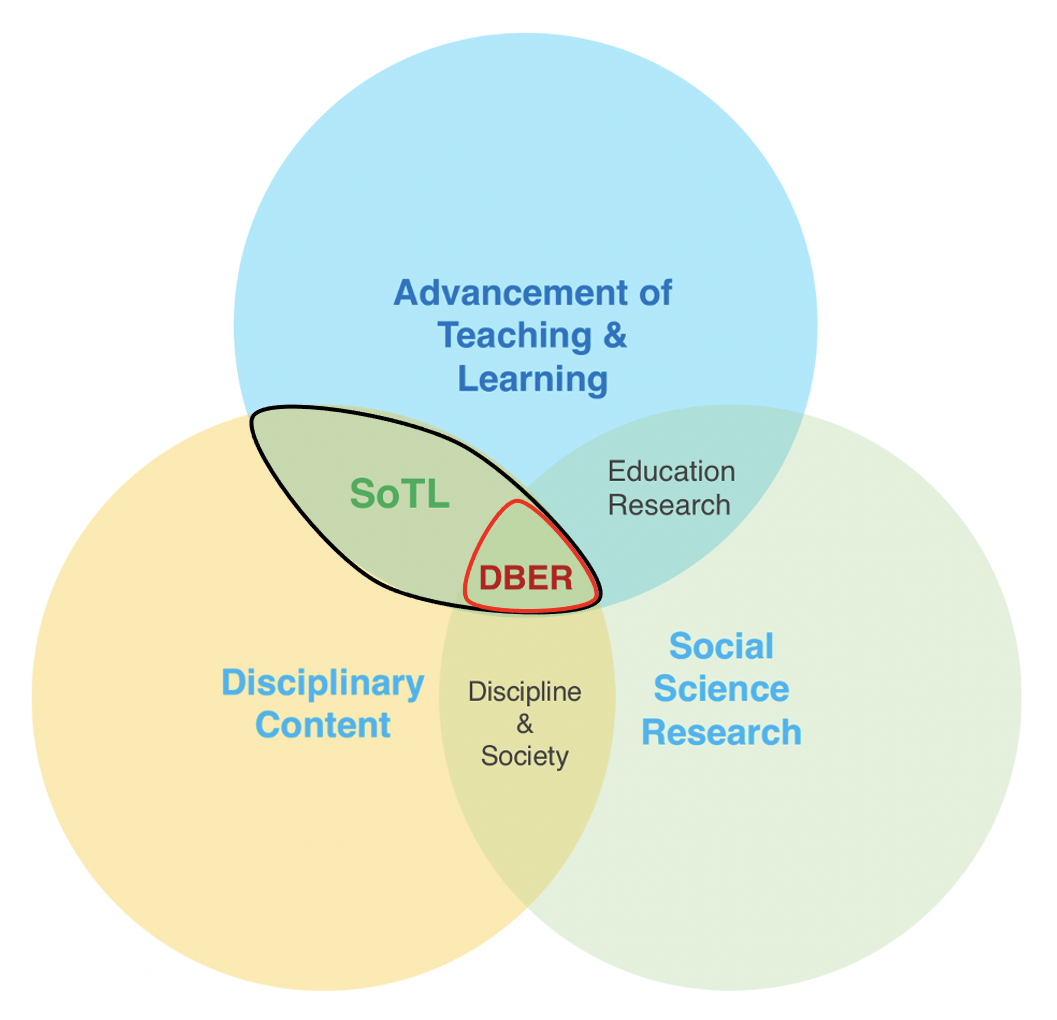2022 Provost's SOLER Seed Grants
Request for Proposals
See the Projects page for information about past and present awardees.
As of the 2022 cycle, the PSSG program is integrated into the broader Office of the Provost Teaching and Learning Grants framework. Read about the opportunities presented by this integration – including a combined SOLER + Innovative Course Design grant worth up to $25,000 – here.
The PSSG program facilitates and supports Discipline-Based Education Research (DBER) efforts at Columbia. DBER is the application of formal research methodologies to the Scholarship of Teaching and Learning (SoTL). Put another way, SoTL is the intersection of disciplinary content and the advancement of teaching and learning, and DBER is a subset of SoTL that intersects with social science research (Figure 1). The PSSG opportunity provides faculty members across the University with funding and in-kind support to engage in DBER – that is, to lead formal research efforts to better understand and improve teaching and learning in Columbia courses. Such efforts fall generally into two categories:
- Developing and empirically testing the impact of innovative pedagogical interventions
- Devising and/or implementing learning analytics procedures
Strong applications will propose interventions or analytics that are grounded in established learning science, feature an experimental or correlational design, and present quantitative methods for measuring student outcomes and/or behaviors.
PSSG awardees may publish their study results in appropriate journals and/or use them as pilot data for grant applications from external agencies (e.g., National Science Foundation, Institute for Education Science). Faculty who apply for such grants or who simply wish to extend the line of inquiry beyond the PSSG duration can apply for continuing SOLER support in the next award cycle.

Figure 1. Discipline-Based Education Research (DBER) lies at the intersection of the advancement of teaching and learning, disciplinary content and social science research. Note that SoTL (black outlined region) is the intersection of disciplinary content and the advancement of teaching and learning, and DBER (red outlined region) is a subset of SoTL that intersects with social science research. In other words, DBER is the application of formal research methodologies to SoTL. Adapted from Lukes, et al. (2015).
Scope
The PSSG supports a wide range of DBER studies that will be implemented in the undergraduate or graduate curriculum at Columbia. As noted above, proposals should center around an innovative pedagogical intervention or learning analytics procedure. Possible project focal points include, but are not limited to, the following:
- Developing and implementing a novel and potentially transformative approach to teaching an undergraduate or graduate course at Columbia
- Situating a rigorously tested pedagogical approach that has been proven to work in one context within another
- Fostering new interdisciplinary collaborations between faculty or students
- Extracting novel insights from data generated by student behavior in the context of a course
Eligibility
- The Principal Investigator (PI) as well as Co-PIs (see below) must be full-time Columbia faculty members.
- Postdocs, graduate students, part-time or adjunct faculty, and staff may be included on proposals as co-investigators but may not serve as PIs or Co-PIs.
Funding
- Teams can apply for up to $5,000 for projects up to 12 months in duration.
- Funding is typically used for these types of expenses:
- Equipment
- Shipping
- Media development
- Compensation for study participants (typically students)
- Compensation for research assistants
- Conference registration
Read about the PSSG proposal requirements here.
Application Process
Applicants are strongly encouraged to schedule an individual consultation with SOLER prior to submitting the application in order to develop the project plan and define the scope of in-kind support. Please contact [email protected] to schedule a consultation. When ready, submit your application through the Office of Teaching, Learning, and Innovation site.
Deadline: Monday, May 2, 2022, at 5:00 P.M.
Support for Awardees
SOLER personnel will assist awardees through in-depth consultations. Services include:
- Framing research objectives and matching study designs to specific aims
- Developing or refining methods of assessment or evaluation
- Devising methods for data analysis and visualization
- Preparing materials for coverage under SOLER’s IRB umbrella protocol
- Developing a plan to disseminate findings
Awardees’ Obligations
By accepting a PSSG, awardees commit to do the following:
- Agree to work with a facilitator from SOLER who will serve as a consultant, provide feedback, and monitor progress according to the project timeline provided in the proposal
- Collaborate on SOLER-led effort to obtain IRB approval for proposed research prior to collecting data
- Participate in the programming offered by SOLER related to the PSSG, including:
- Attending a virtual PSSG workshop/planning session for all awardees
- One or more of the following:
- Presenting project outcome at the next PSSG information session for prospective applicants
- Leading a journal club session for fellow PSSG-awardees on a topic related to the research project
- Participating in the SOLER spotlight video series
- Submit a final project report within 12 months of receiving funds
- Acknowledge receipt of SOLER support in any presentation or publication of work resulting from this support
Review Criteria
Funding decisions will result from peer review of proposals in response to this call. Reviews for submitted proposals will be based on:
- The potential impact of the project on student experience
- The soundness, creativity, and uniqueness of the proposed scholarship and its potential contribution to the advancement of the field of research-driven SoTL (i.e., DBER).
- The appropriateness of the budget and project scope, including faculty time commitment
- The sustainability and long-term impact of the project, including the scholars’ potential to serve as resources for others in the DBER community
Review Process
A panel consisting of SOLER Faculty Committee members and SOLER staff will review proposals after the May 2, 2022 deadline.
